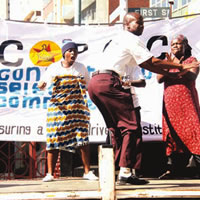Bickering over constitution making is retrogressive

exercise.
The problem is what political parties stand for.
The nature of political parties is to sell their ideas to the ordinary citizen of the country.
To claim that people will say what they want without the influence of parties is naive.
Recently, the UK had their referendum of the voting system.
The Conservative party convinced the voters that a change was not necessary while their partners in Government, the Liberal Democrats, were for proportional voting system.
The Conservatives won the vote for not changing the sytem of first past the post regardless of whether the candidate did not win an absolute majority in a consituency.
The same is happening here in Zimbabwe where one party may have persuaded those consultated to back its position on the constitution.
The voice of the people must carry the day, not a negotiated constitution which was rejected by other parties to start with.
It would be a negation of the will of the people if some parties start now to call for a negotiated constitution.
When parties were given a chance to come up with the provisions of a new constitution, a Kariba Draft constitution was drawn up and signed by three parties.
Then came the GPA, and it was agreed that the basis of the new costitution must reflect the Kariba Draft constitution.
One party went to sell the Kariba Draft to the people. If other parties had their own version of the contitution they wanted to sell to the people, that was fine and acceptable, in a democratic environment.
If the majority of the people consulted endorsed the Kariba Draft provisions as a basis for the new constitution, then no other party should cry foul. Reports in the press that the process of collating the views of the people is causing confusion because what one party advocated seems to gain support, so be it.
The country has painstakingly built state institutions for the past 31 years of independence.
Maybe what is at stake is to define the functions of these institutions not to abolish them.
Everybody should be aware that the country needs a president and parliament; the judiciary, the army etc.
But, what is difficult to build is a culture of tolerance in our society. Do we need a culture of an electoral system that is first past the post or, a system of proportional representation like that prevailing in South Africa?
What must be determined by the country’s legal system is whether to continue with the Roman-Dutch law or to adopt a Zimbawean law, which will protect our cultural values?
To concenrate too much on the politics of power would be to miss the point.
Our constitutional development must address the cultural way of running the country not the adoption of foreign norms into our Law.
People of any country are affected, in their daily lives, by what they experience at first hand.
Those are the issues that are paramonut and must be embodied in the constitution.
For example, local government is at the root of any governance in a country.
If democracy cannot be practised at that level, then national politics would be meaningless.
What we have experienced during 31 years of Independence is lack of the delivery system at local government level, no matter what party was in control or voted in that level.
Examples are many especially in towns and cities although one cannot ignore the rural areas or district councils – misgovernance and lack of the delivery system even after residents have paid millions of dollars in rates and other fees.
The culture of these councils rewar-ding themselves huge salaries at the expense of the residents is so endemic that no election can change that culture of doing these things with impunity.
Will the constitution have provisions to change the system of impunity?
The concentration on the control of the levers of power in our politics will not address the real issues the people want.
The constitution must be a framework of the values we want, not about power games.
The country is eagerly awaiting the draft constitution, to peruse it, to digest it, before it is sent to parliament for further discussion by the peoples’ representatives and for the final say of the people in a referundum.







Comments